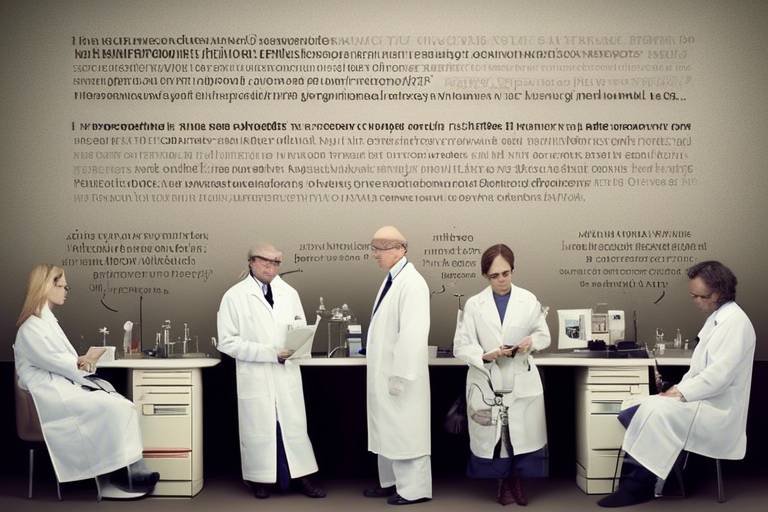Are Shortcuts Morally Defensible?
In today's fast-paced world, the temptation to take shortcuts is ever-present. Whether it's in our personal lives, professional settings, or even in our education, we often find ourselves weighing the benefits of a quicker path against the ethical implications of our choices. But are these shortcuts truly morally defensible? This question opens a Pandora's box of philosophical debates, psychological insights, and real-world consequences that can leave us feeling perplexed.
At first glance, shortcuts might seem like a practical solution to the demands of modern life. After all, who wouldn’t want to save time and effort? However, as we delve deeper, we uncover a complex web of ethical considerations that challenge the notion that shortcuts are simply a matter of convenience. From the perspective of utilitarianism, which focuses on the greatest good for the greatest number, shortcuts can sometimes be justified if they lead to a favorable outcome. But what happens when the pursuit of efficiency compromises our integrity or the well-being of others?
On the other hand, deontological ethics emphasizes the importance of duty and adherence to moral rules, regardless of the consequences. This perspective raises critical questions: Is it acceptable to take a shortcut if it involves dishonesty or harm to others? In scenarios where our actions might benefit us but negatively impact someone else, the moral justification for taking shortcuts becomes murky. This internal conflict often leaves individuals grappling with guilt and second-guessing their decisions.
Moreover, our psychology plays a significant role in our inclination to take shortcuts. Cognitive biases, such as the availability heuristic, often lead us to favor immediate solutions over more thoughtful, time-consuming approaches. We might justify our shortcuts with rationalizations, convincing ourselves that the ends justify the means. However, this mindset can lead to a slippery slope where ethical boundaries become blurred, making it essential to examine our motivations and the potential consequences of our actions.
So, what motivates people to take shortcuts? The reasons can be varied and complex. Here are a few common motivations:
- Efficiency: In an age where time is money, many individuals prioritize expedience over thoroughness.
- Convenience: Shortcuts often present themselves as easier options that require less effort.
- Peer Pressure: In competitive environments, the urge to keep up with others can drive individuals to cut corners.
While these motivations may seem harmless, they can clash with ethical considerations, leading to moral dilemmas. For instance, the societal pressure to succeed can push individuals to prioritize results over integrity, raising questions about the long-term implications of such choices.
Additionally, the consequences of taking shortcuts can be profound and far-reaching. From corporate scandals to academic dishonesty, the fallout from these decisions can tarnish reputations, destroy trust, and lead to significant harm. Consider the infamous case of the Volkswagen emissions scandal, where the company took shortcuts in regulatory compliance. The repercussions included hefty fines, legal battles, and a damaged public image. Such examples urge us to reevaluate the moral defensibility of shortcuts and the risks associated with prioritizing expediency over ethical considerations.
In the professional realm, shortcuts can be particularly tempting. Many workplaces foster a culture of efficiency where employees might feel pressured to deliver results quickly, often at the expense of ethical standards. This can lead to a toxic environment where accountability is compromised. As employees weigh the risks of taking shortcuts against the potential rewards, the moral implications of their decisions become increasingly complex.
In conclusion, while shortcuts can offer immediate benefits, their moral defensibility remains a contentious issue. The interplay of ethical theories, psychological influences, and real-world consequences paints a nuanced picture that requires careful consideration. As we navigate our choices, it's essential to reflect on the broader implications of our actions and strive for a balance between efficiency and integrity.
- What are the main ethical theories regarding shortcuts? The main theories include utilitarianism, which focuses on outcomes, and deontology, which emphasizes moral duties.
- How does psychology influence shortcut-taking? Cognitive biases can lead individuals to favor quicker, easier solutions over more thoughtful approaches.
- What are the potential consequences of taking shortcuts? Shortcuts can lead to ethical breaches, loss of trust, and negative outcomes in both personal and professional settings.

The Ethical Framework of Shortcuts
When we think about taking shortcuts, it’s essential to dive into the ethical framework that surrounds this concept. Shortcuts can seem enticing, like a fast lane on a highway that promises to get you to your destination quicker. However, just like that highway, the path of shortcuts can be fraught with moral dilemmas. To truly understand whether these shortcuts are morally defensible, we need to explore various ethical theories that help us navigate this complex terrain.
One of the most prominent theories is utilitarianism, which suggests that the morality of an action is determined by its outcomes. In simpler terms, if taking a shortcut leads to a greater good for the majority, it may be considered morally acceptable. For example, if a company chooses to streamline its production process, reducing costs and passing savings onto consumers, that might be seen as a positive shortcut. However, the key question remains: does this shortcut come at the expense of quality or ethical labor practices? If the shortcut leads to harm or exploitation, then the utilitarian argument loses its strength.
On the other hand, we have deontology, an ethical framework that emphasizes duty and adherence to rules. According to deontological ethics, some actions are inherently right or wrong, regardless of their consequences. This perspective argues that taking shortcuts can often violate moral duties. For instance, if a student cheats on an exam to achieve a higher grade, they are not only undermining their own education but also violating the ethical standards of academic integrity. Here, the shortcut is not just a matter of efficiency; it’s a breach of trust that has wider implications.
To further illustrate these ethical frameworks, let’s consider a table that contrasts the two approaches:
| Ethical Theory | Focus | Implications for Shortcuts |
|---|---|---|
| Utilitarianism | Consequences of actions | Shortcuts may be justified if they lead to greater overall happiness. |
| Deontology | Adherence to rules and duties | Shortcuts are often seen as unethical if they violate established moral principles. |
Moreover, the context in which shortcuts are taken plays a crucial role in determining their moral defensibility. For instance, in a high-pressure work environment where deadlines are tight, employees may feel compelled to take shortcuts for the sake of efficiency. While this may seem justifiable in the moment, it raises questions about the long-term implications of such actions. Are we sacrificing quality for speed? Are we compromising our values for the sake of productivity?
Additionally, the motivations behind taking shortcuts can be complex. Sometimes, they stem from a desire for efficiency or convenience, but other times, they may arise from fear of failure or external pressures. It’s important to recognize that while shortcuts can save time and effort, they may also lead to ethical compromises that can haunt us later on. As we navigate through life, we must constantly weigh the benefits of shortcuts against the potential moral costs.
In conclusion, the ethical framework surrounding shortcuts is multifaceted, involving a delicate balance between the consequences of our actions and our moral duties. By understanding the principles of utilitarianism and deontology, we can better navigate the murky waters of shortcut-taking and strive to make choices that align with our values. So, next time you’re tempted to take the easy route, ask yourself: is this shortcut worth the potential ethical fallout?

Psychological Perspectives on Shortcuts
When we talk about shortcuts, it's essential to understand the psychological factors that drive people to choose the easy route rather than the more challenging one. Our brains are wired for efficiency, and this innate desire often leads us to take shortcuts in various aspects of life. But why do we do this? The answer lies in a combination of cognitive biases, emotional responses, and learned behaviors that shape our decision-making processes.
One significant psychological concept relevant to shortcuts is the cognitive bias. Cognitive biases are systematic patterns of deviation from norm or rationality in judgment, which can lead us to make flawed decisions. For instance, the availability heuristic suggests that people tend to rely on immediate examples that come to mind when evaluating a specific topic. This means if we’ve seen someone take a shortcut and succeed, we might be more inclined to believe that shortcutting is an acceptable practice. This bias can create a slippery slope where shortcuts become normalized, even when they may not be the best choice.
Another aspect to consider is the role of emotions in our decision-making. When faced with a challenging task, feelings of anxiety or overwhelm can push us towards shortcuts as a way to alleviate stress. It's almost like a mental escape. In these moments, the brain seeks quick relief, often prioritizing immediate gratification over long-term consequences. This emotional response can cloud our judgment, making it easier to justify taking shortcuts even when we know deep down that they may not be the right choice.
Moreover, our social environment can significantly influence our shortcut-taking behavior. We are social creatures, and the behaviors of those around us can shape our own choices. If friends or colleagues routinely take shortcuts, we may feel pressured to do the same to fit in or keep pace. This phenomenon is particularly evident in competitive environments, where the pressure to achieve results quickly can lead individuals to compromise their values. It raises the question: are we making these choices independently, or are we simply following the crowd?
In summary, the psychological perspectives on shortcuts reveal a complex interplay of cognitive biases, emotional responses, and social influences. Understanding these factors is crucial for recognizing why we might be tempted to take shortcuts in our own lives. As we navigate through various situations, it's essential to reflect on whether these shortcuts serve us well or lead us down a path of ethical ambiguity.
- What are cognitive biases? Cognitive biases are systematic patterns of deviation from norm or rationality in judgment, which can lead to flawed decisions.
- How do emotions influence decision-making? Emotions can cloud our judgment, pushing us toward shortcuts for immediate relief rather than long-term benefits.
- Can social pressure lead to taking shortcuts? Yes, social environments can significantly influence our choices, often leading us to take shortcuts to fit in or keep up.

Motivations Behind Taking Shortcuts
When it comes to taking shortcuts, the reasons behind our decisions can be as varied as the paths we choose. One of the most compelling motivations is the desire for efficiency. In a world that seems to be spinning faster every day, who wouldn't want to save a little time? Imagine you’re racing against the clock, juggling work, family, and social obligations. The temptation to find the quickest route can be overwhelming. But is this motivation purely practical, or does it also tap into deeper psychological needs?
Another significant factor is convenience. In our busy lives, we often seek out the easiest solutions to problems. For instance, consider how many people opt for fast food instead of cooking a healthy meal at home. The allure of convenience can lead us to make choices that prioritize immediate satisfaction over long-term benefits. But this raises an important question: does convenience come at a moral cost?
Moreover, societal influences play a crucial role in shaping our motivations. We live in a culture that often glorifies speed and instant results. This pressure can push individuals to take shortcuts to keep up with their peers or meet expectations. Think about it: how often have you felt the need to rush through a project just to meet a deadline, even if it meant cutting corners? This societal pressure can create a moral dilemma, as we weigh the benefits of fitting in against the potential ethical ramifications of our actions.
In addition, cognitive biases can cloud our judgment. For example, the optimism bias leads us to believe that we are less likely to encounter negative outcomes than others. This can make shortcuts seem more appealing, as we underestimate the risks involved. We might think, "It won't happen to me," when deciding to take a shortcut, whether in our careers or personal lives. This skewed perception can lead to a cycle of poor decision-making, where shortcuts become a habitual response to challenges.
Ultimately, the motivations behind taking shortcuts are complex and multifaceted. They intertwine our need for efficiency, our desire for convenience, the influence of societal pressures, and the tricks our minds play on us. As we navigate these motivations, it's essential to pause and reflect on the potential moral implications of our choices. Are we merely seeking to make life easier, or are we sacrificing our integrity in the process?
- What are some common examples of shortcuts people take? Shortcuts can range from minor decisions, like taking a less healthy meal option, to significant ethical breaches, such as cheating in school or work.
- Are there situations where taking shortcuts is justified? While some shortcuts may be practical and necessary, it’s crucial to evaluate the potential consequences and whether they align with ethical standards.
- How can one resist the temptation to take shortcuts? Building awareness of the motivations behind our choices and considering the long-term effects can help in resisting shortcuts.
- What role does accountability play in taking shortcuts? Accountability encourages individuals to adhere to ethical standards and can deter them from taking shortcuts that compromise integrity.

Societal Pressure and Shortcuts
In our fast-paced world, societal pressure can often push individuals toward taking shortcuts, sometimes leading to morally ambiguous decisions. Think about it: when everyone around you seems to be rushing to achieve their goals, it can feel like you’re running a marathon with a boulder on your back if you choose to take the long route. This pressure can manifest in various forms, from workplace expectations to social media influences, compelling us to prioritize speed over ethical considerations.
Take, for instance, the workplace environment. Employees may feel the heat to meet deadlines or surpass targets, leading them to cut corners. The phrase "time is money" rings loud in corporate corridors, creating a culture where efficiency is king. But at what cost? When the drive to succeed overshadows the importance of integrity, employees may find themselves in a moral quandary, weighing the benefits of shortcuts against their personal values.
Moreover, societal norms can dictate what is considered acceptable behavior, often blurring the lines of right and wrong. In educational settings, students may feel pressured to cheat or plagiarize to keep up with their peers. The fear of falling behind can be overwhelming, pushing them to make choices that compromise their integrity. This raises a critical question: are we sacrificing our morals on the altar of societal expectations?
To illustrate this point further, let's consider a few common scenarios where societal pressure leads to shortcuts:
- Workplace Performance: Employees might falsify reports or take credit for others' work to appear more competent.
- Academic Integrity: Students may resort to cheating during exams to maintain their grades, fearing the repercussions of failure.
- Social Media Influence: Individuals might curate a false online persona, exaggerating achievements to fit in with their peers.
These examples highlight a troubling trend: when the collective mindset prioritizes results over ethical behavior, individuals may feel justified in taking shortcuts. However, the consequences of such actions can be far-reaching. Not only do they erode trust in personal and professional relationships, but they can also contribute to a culture of dishonesty and lack of accountability.
Ultimately, the societal pressure to take shortcuts can create a slippery slope, where minor ethical breaches gradually escalate into more significant moral failures. It begs the question: how do we balance the desire for efficiency with the need for integrity? As we navigate these challenges, it’s essential to foster an environment that values ethical behavior and encourages individuals to resist the temptation of taking shortcuts, even when the pressure mounts.
- What are shortcuts in the context of ethics? Shortcuts refer to actions taken to achieve results more quickly, often at the expense of ethical considerations.
- How can societal pressure influence ethical decision-making? Societal pressure can create an environment where individuals prioritize speed and efficiency over integrity, leading to morally questionable choices.
- What are the long-term consequences of taking shortcuts? Shortcuts can damage trust, erode personal integrity, and contribute to a culture of dishonesty, impacting both personal and professional relationships.

Consequences of Shortcuts
Taking shortcuts can often seem like a tempting option, especially when life gets busy and the pressure mounts. However, the consequences of these shortcuts can be far-reaching and, at times, devastating. When we opt for the quick and easy route, we may overlook important details that can lead to significant ethical breaches. Think of it like trying to bake a cake without measuring the ingredients; you might end up with a delicious treat, but more often than not, you’ll create a mess that leaves everyone disappointed.
One of the most glaring consequences of shortcuts is the potential for unintended outcomes. For instance, consider a healthcare professional who decides to skip essential steps in a patient’s treatment plan to save time. This decision, made in the name of efficiency, could lead to serious health risks for the patient. Such scenarios highlight the critical need for diligence and thoroughness, especially in fields where lives are at stake. The ripple effect of one small shortcut can lead to a cascade of negative repercussions, affecting not just the individual but the entire community.
Moreover, shortcuts can erode trust. In professional settings, when employees take shortcuts that compromise quality or ethics, it can lead to a culture of skepticism. Colleagues may begin to question each other's integrity, creating a toxic work environment. For instance, if a software developer rushes through a project to meet a deadline, they might introduce bugs that not only frustrate users but also damage the company's reputation. Trust, once broken, is incredibly hard to rebuild, and the long-term effects can outweigh any short-term gains made by taking shortcuts.
Another consequence worth mentioning is the impact on personal growth. When individuals consistently take shortcuts, they may miss out on valuable learning experiences. Imagine a student who cheats on an exam to get a good grade. While they may achieve immediate success, they forfeit the opportunity to truly understand the material, which can have lasting implications on their knowledge and skills. In the long run, this can lead to a lack of competence and confidence, creating a cycle where shortcuts become the norm rather than the exception.
To illustrate the potential fallout from shortcuts, consider the following table that outlines some common areas where shortcuts can lead to negative consequences:
| Area | Potential Consequences |
|---|---|
| Healthcare | Compromised patient safety, increased risk of malpractice |
| Workplace | Erosion of trust, decreased team morale, damaged reputation |
| Education | Lack of understanding, diminished critical thinking skills, academic dishonesty |
| Technology | Security vulnerabilities, software bugs, user dissatisfaction |
In summary, while shortcuts may offer a quick fix to our immediate problems, their consequences can be profound and far-reaching. They can compromise safety, erode trust, and stunt personal growth, ultimately leading to a cycle of negative outcomes. The allure of taking the easy way out can be strong, but it’s essential to weigh these consequences carefully before making a decision. After all, as the saying goes, “You get what you pay for,” and sometimes, the price of a shortcut is far too high.
- What are some common examples of shortcuts in daily life?
Common examples include skipping exercise routines, taking the easy way out in work projects, or using quick fixes in cooking instead of following recipes.
- Are there any situations where taking shortcuts is justified?
In emergencies or when time is critically short, some shortcuts may be necessary. However, it’s essential to assess the risks involved and the potential impact on others.
- How can I avoid taking unethical shortcuts?
Focus on the long-term consequences of your actions, prioritize integrity and quality, and create a supportive environment where ethical behavior is encouraged.

Shortcuts in Professional Settings
In the fast-paced world of professional environments, the allure of taking shortcuts can be incredibly tempting. Imagine you're in a race, and you see a path that could shave off significant time. Wouldn’t you want to take it? In the workplace, this metaphor rings true as employees often find themselves faced with the choice between efficiency and ethical integrity. The pressure to meet deadlines, exceed targets, and perform consistently can lead individuals to opt for quicker, easier methods that might not align with their moral compass.
However, the implications of such shortcuts can be profound. For instance, when employees prioritize speed over thoroughness, they may overlook important details that could lead to mistakes. This can be particularly damaging in sectors like healthcare, finance, or law, where precision is paramount. A simple oversight in a medical chart or a miscalculation in financial reporting can have dire consequences, not just for the individual but for clients and the organization as a whole.
Moreover, shortcuts can erode trust within teams. When one member takes a shortcut that compromises quality, it can lead to resentment among colleagues who are committed to doing the right thing. This creates a toxic work culture where the emphasis shifts from collaboration and accountability to self-preservation. Ultimately, the long-term effects of these shortcuts can outweigh the short-term benefits, leading to a cycle of ethical breaches and diminished morale.
To illustrate this, consider a scenario where a project manager decides to cut corners on a critical project timeline by skipping essential quality checks. While this may seem like a smart move to meet a deadline, the repercussions could include client dissatisfaction, potential legal issues, and damage to the company’s reputation. Such outcomes raise the question: is it worth compromising integrity for the sake of expediency?
In professional settings, it is crucial to foster a culture that values ethical decision-making over mere efficiency. Companies can implement training programs that emphasize the importance of integrity and accountability. Additionally, clear communication about the potential consequences of taking shortcuts can help employees understand the risks involved.
In conclusion, while shortcuts may offer immediate benefits in terms of time and effort, they often come with hidden costs that can undermine both personal and organizational integrity. It’s essential for professionals to weigh the potential risks against the rewards and to cultivate an environment where ethical practices are prioritized. After all, in the grand scheme of things, the reputation of an individual or a business is built on the foundation of trust and ethical behavior.
- What are the most common shortcuts taken in professional settings? Shortcuts can include skipping quality checks, bypassing protocols, or relying on incomplete information to make decisions.
- How can organizations discourage shortcuts? Organizations can establish a strong ethical framework, provide training, and promote a culture of accountability.
- What are the potential consequences of taking shortcuts? The consequences can range from minor mistakes to significant legal issues or damage to a company's reputation.
- Are there situations where shortcuts are acceptable? Some situations may warrant shortcuts, particularly when they do not compromise quality or ethics, but these should be carefully evaluated on a case-by-case basis.

Case Studies of Shortcuts
When we talk about shortcuts, it's crucial to look at real-world examples that illuminate the moral implications of taking these paths. These case studies reveal not just the outcomes of shortcuts but also the ethical dilemmas that often accompany them. Let's explore a few significant instances that encapsulate the essence of shortcuts in various domains.
One notable example comes from the corporate world. In 2015, the Volkswagen emissions scandal shook the automotive industry. Volkswagen, in an effort to meet regulatory standards while still promoting their vehicles as environmentally friendly, decided to take a shortcut. They developed software that manipulated emissions tests, allowing cars to appear compliant when they were not. This decision was driven by a desire for market dominance and profit, but it resulted in severe backlash.
Not only did this shortcut lead to financial penalties exceeding $30 billion, but it also caused irreparable harm to the company's reputation. Consumers felt betrayed, and the trust that had taken years to build was shattered overnight. This case raises a pivotal question: was the shortcut worth the long-term consequences? It’s a classic example of how prioritizing immediate gains over ethical considerations can lead to catastrophic outcomes.
Another compelling case study can be found in the realm of healthcare. In 2014, an outbreak of Legionnaires' disease in Flint, Michigan, highlighted the dangers of taking shortcuts in public health policy. In an effort to save costs, officials decided to switch the city’s water supply without adequately treating it. This shortcut not only compromised water quality but also led to serious health risks for the residents, resulting in several deaths.
The ethical implications here are staggering. The decision to prioritize financial savings over the health and safety of citizens raises questions about accountability and responsibility. When shortcuts are taken in such critical areas, the moral cost can be immeasurable. This scenario serves as a stark reminder of the potential fallout from ignoring ethical standards in favor of expediency.
In the education sector, we can observe shortcuts manifesting through academic dishonesty. A case that gained significant media attention involved several students at a prestigious university who were found to be using essay-writing services to complete their assignments. Initially, these students believed they were merely finding a more efficient way to manage their workloads. However, this shortcut led to severe disciplinary actions, including expulsion for many.
This situation illustrates a crucial point: while shortcuts may seem like a quick fix, they can undermine the very foundation of education—integrity and learning. Students who opt for these shortcuts not only jeopardize their academic careers but also miss out on the valuable lessons that come from grappling with challenges. The moral implications of such actions extend beyond individual consequences; they affect the entire academic community, as trust in the system erodes.
Finally, let’s consider the impact of technology on shortcuts. The rise of social media has created a culture where information is disseminated rapidly, often without verification. A recent study found that misleading information spreads six times faster than accurate news. This phenomenon exemplifies how technological shortcuts can lead to ethical dilemmas, such as the dissemination of false information that can sway public opinion and affect democratic processes.
In conclusion, these case studies emphasize that while shortcuts may offer immediate benefits, they often come with significant ethical costs. Whether in business, healthcare, education, or technology, the decision to take shortcuts can lead to consequences that far outweigh the initial gains. As we navigate through life, it’s essential to weigh the moral implications of our choices and consider whether the shortcuts we take are truly defensible.
- What are the main ethical theories related to shortcuts?
Ethical theories such as utilitarianism and deontology provide frameworks for understanding the moral implications of taking shortcuts. Utilitarianism focuses on the greatest good for the greatest number, while deontology emphasizes adherence to rules and duties. - How do societal pressures influence our decision to take shortcuts?
Societal expectations can create a culture where shortcuts are normalized. Peer influence and cultural norms may push individuals to prioritize efficiency over ethical considerations, leading to moral dilemmas. - What are the potential consequences of taking shortcuts?
Shortcuts can lead to unintended consequences, such as loss of trust, legal repercussions, and damage to personal and organizational reputations. It's crucial to consider these risks before opting for a shortcut.

Shortcuts in Technology
In our fast-paced digital age, technology has become synonymous with efficiency, often providing us with shortcuts that promise to save time and effort. But have you ever stopped to consider the ethical implications of these technological shortcuts? While they can make our lives easier, they also raise significant questions about integrity, authenticity, and the long-term consequences of relying on them. For instance, consider how we often use search engines to quickly find answers rather than engaging in deeper research. This practice can lead to a superficial understanding of complex issues, ultimately diminishing our critical thinking skills.
Moreover, technology has introduced shortcuts in various fields, from software development to healthcare. In software engineering, developers may opt for pre-built libraries and frameworks to expedite the coding process. While this can lead to faster project completion, it may also introduce security vulnerabilities if those shortcuts are not thoroughly vetted. Similarly, in healthcare, the use of telemedicine has surged, allowing patients to access care without the traditional barriers of time and travel. However, this convenience can sometimes compromise the quality of patient-provider interactions, leading to misdiagnoses or inadequate care.
Let's take a look at some of the common technological shortcuts and their implications:
| Shortcut | Pros | Cons |
|---|---|---|
| Search Engines | Quick access to information | Superficial understanding |
| Pre-built Software Libraries | Faster development time | Potential security risks |
| Telemedicine | Convenient access to care | Risk of misdiagnosis |
In addition, the rise of artificial intelligence has introduced yet another layer of complexity. AI systems can automate decision-making processes, which can be incredibly efficient. However, this raises ethical questions about accountability. If an AI makes a mistake due to a shortcut in its programming, who is responsible? The developer? The user? Or is it simply a flaw in the technology itself? These questions highlight the moral dilemmas we face as we increasingly rely on technology to make decisions for us.
Furthermore, the convenience of technological shortcuts can lead to a sense of complacency. When we rely too heavily on technology to do our thinking for us, we risk losing the ability to engage in deep, meaningful reflection. This can have profound implications for our personal growth and moral development. Are we becoming so accustomed to shortcuts that we no longer value the journey of learning and understanding? As technology continues to evolve, we must remain vigilant and critically assess the impact of these shortcuts on our lives and society.
In conclusion, while technology offers incredible advantages through shortcuts, it is essential to weigh these benefits against the potential ethical pitfalls. By fostering a culture of critical thinking and accountability, we can navigate the complexities of technological shortcuts more responsibly.
- What are some examples of shortcuts in technology? Shortcuts in technology include using search engines for quick information, employing pre-built software libraries, and utilizing telemedicine for healthcare.
- Are technological shortcuts always bad? Not necessarily. While they can offer efficiency and convenience, they also come with ethical implications that need to be considered.
- How can we mitigate the risks associated with technological shortcuts? By promoting critical thinking, ethical accountability, and thorough evaluation of the tools we use, we can better navigate the complexities of technology.

Shortcuts in Education
Education is often viewed as a journey, a path that shapes not only our knowledge but also our character. However, in this fast-paced world, many students find themselves tempted to take shortcuts in their academic pursuits. These shortcuts can manifest in various forms, from plagiarism to cheating on exams, and while they may offer immediate relief or success, the long-term implications can be devastating.
One of the primary reasons students resort to shortcuts is the overwhelming pressure they face. The competitive nature of education today can feel like a race, with students constantly striving to outperform their peers. This pressure can lead to a culture where shortcuts become normalized. In fact, a recent survey indicated that approximately 30% of high school students admitted to cheating at least once in the past year. This statistic raises a crucial question: are we compromising our integrity in the pursuit of grades?
Moreover, the rise of technology has made it easier than ever to take shortcuts. With the internet at our fingertips, students can quickly find answers to homework questions or even purchase essays online. While these tools can be beneficial in moderation, they can also foster a mindset that values expedience over understanding. This trend is alarming, as it not only undermines the educational process but also affects the moral fabric of future generations.
It's essential to recognize that shortcuts in education do not just affect the individual student. They have broader implications for society as a whole. When students cheat or take the easy way out, they miss out on critical learning experiences that help develop essential skills such as critical thinking, problem-solving, and ethical reasoning. These skills are vital not only for academic success but also for functioning effectively in the workplace and society.
To illustrate the impact of shortcuts in education, consider the following table that compares the outcomes of students who take shortcuts versus those who engage fully in their learning:
| Aspect | Students Taking Shortcuts | Students Engaging Fully |
|---|---|---|
| Knowledge Retention | Low | High |
| Problem-Solving Skills | Poor | Excellent |
| Ethical Understanding | Weak | Strong |
| Future Success | Uncertain | Promising |
As we can see, the consequences of taking shortcuts in education extend far beyond the classroom. They can lead to a lack of preparedness for real-world challenges and a diminished sense of personal integrity. Therefore, it is crucial for educators, parents, and students to foster an environment that values hard work and ethical behavior over quick fixes.
In conclusion, while shortcuts may seem appealing in the moment, they often come with a hefty price tag. The integrity of our education system relies on the commitment of students to engage fully in their learning journey. By resisting the urge to take shortcuts, students not only enhance their own knowledge and skills but also contribute to a more ethical and competent society.
- What are some common types of shortcuts students take in education? Students often resort to plagiarism, using online essay services, or copying homework from peers.
- How can educators discourage shortcuts? Educators can promote a culture of integrity by emphasizing the importance of learning, providing support, and implementing strict policies against cheating.
- What are the long-term effects of taking shortcuts in education? Long-term effects can include a lack of preparedness for future challenges, diminished critical thinking skills, and ethical dilemmas in professional settings.
Frequently Asked Questions
- What are shortcuts in ethical terms?
Shortcuts refer to methods or paths that reduce the time or effort needed to achieve a goal. Ethically, they raise questions about whether the means justify the ends, especially when they compromise integrity or fairness.
- Are there ethical frameworks that justify taking shortcuts?
Yes, some ethical theories, like utilitarianism, suggest that if a shortcut leads to greater overall happiness or efficiency, it may be justified. However, deontological perspectives argue that certain actions are inherently wrong, regardless of the outcomes.
- What psychological factors influence shortcut-taking?
Human psychology plays a significant role in shortcut-taking. Cognitive biases, such as the desire for instant gratification, can lead individuals to choose quicker, easier options, often without considering the long-term consequences.
- How do societal pressures affect our decisions about shortcuts?
Societal expectations and cultural norms can heavily influence our choices. When peers or society at large prioritize speed and efficiency, individuals may feel compelled to take shortcuts, even if it conflicts with their moral beliefs.
- What are some consequences of taking shortcuts?
While shortcuts can save time, they can also lead to negative outcomes, such as ethical breaches or diminished quality. For example, shortcuts in professional settings may compromise accountability and integrity, leading to serious repercussions.
- How do shortcuts manifest in professional environments?
In the workplace, shortcuts often tempt employees to prioritize efficiency over ethical standards. This can result in a culture of cutting corners, which can undermine trust and accountability within teams and organizations.
- Can you provide examples of shortcuts in technology?
Technology offers numerous shortcuts, like automated processes and software tools. However, these conveniences can pose ethical dilemmas, such as data privacy concerns or the potential for misuse, prompting us to reconsider their moral implications.
- What are the implications of shortcuts in education?
In educational settings, shortcuts often manifest as cheating or plagiarism. These actions not only jeopardize academic integrity but can also hinder students' moral development, leading to long-term consequences in their personal and professional lives.



















